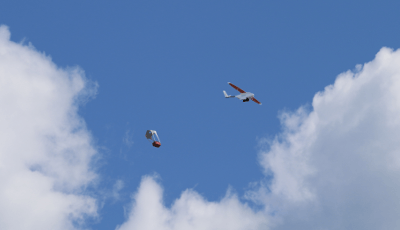Drones to deliver essential medicine to remote communities

Poor road infrastructure in Sub-Saharan Africa leave many people in remote areas with insufficient access to essential medicine and blood packets. To get these live-saving deliveries to their destination, several organizations are setting up cargo drone networks to transport these essential goods by air.
Poor road infrastructure in Sub-Saharan Africa leaves many people in remote areas with insufficient access to essential medicine and blood packets. To get these live-saving deliveries to their destination, several organizations are setting up cargo drone networks to transport these essential goods by air.
Only one in three people in rural Sub-Saharan Africa live within 2 km of an all-season road. Poor connectivity to the transportation network makes it difficult to deliver medical supplies to rural communities. The inadequate access to essential medicine and blood products causes people to needlessly suffer from and even die of preventable and treatable diseases.
But building dense road networks that connect all people is a hugely difficult if not impossible task in Sub-Saharan Africa due to the vastness of the region, the high cost of constructing and maintaining roads, and rapid population growth. Therefore, alternative solutions are needed to deliver essential goods to people. Leaving behind the cumbersome endeavor of transportation by land, several pioneering organizations are taking to the sky.
Red Line
Red Line is a cargo drone project aimed at delivering blood and essential medicines to underserved communities in hard-to-reach areas. The project is currently in its development stage. Utilizing low-cost drones that have a 50 km range and carry a 10 kg payload, Red Line aims to build networks of droneports to have a wide reach with its delivery system. In 2015 the architect studio Foster + Partners announced it will build the first droneport for the Red Line project in Rwanda. The port is scheduled to be finished in 2020.
Only one in three people in rural Sub-Saharan Africa live within 2 km of an all-season road. Poor connectivity to the transportation network makes it difficult to deliver medical supplies to rural communities. The inadequate access to essential medicine and blood products causes people to needlessly suffer from and even die of preventable and treatable diseases.
But building dense road networks that connect all people is a hugely difficult if not impossible task in Sub-Saharan Africa due to the vastness of the region, the high cost of constructing and maintaining roads, and rapid population growth. Therefore, alternative solutions are needed to deliver essential goods to people. Leaving behind the cumbersome endeavor of transportation by land, several pioneering organizations are taking to the sky.
Red Line
Red Line is a cargo drone project aimed at delivering blood and essential medicines to underserved communities in hard-to-reach areas. The project is currently in its development stage. Utilizing low-cost drones that have a 50 km range and carry a 10 kg payload, Red Line aims to build networks of droneports to have a wide reach with its delivery system. In 2015 the architect studio Foster + Partners announced it will build the first droneport for the Red Line project in Rwanda. The port is scheduled to be finished in 2020.
